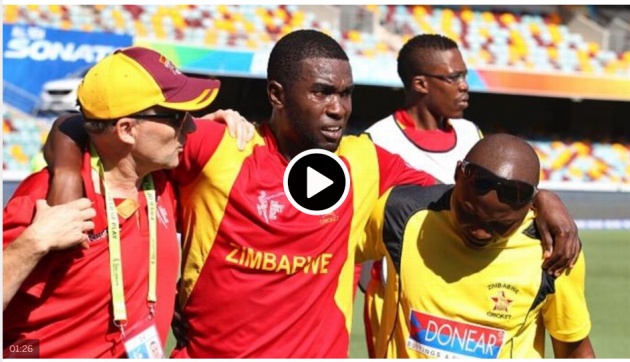Harare 1995, Sheikhupera 1998, Harare 2013 and now, just 20 runs away from Brisbane 2015. Five fours. Three sixes and a two. All the extras Zimbabwe gave away. So close. As Franki Valli and the Four Seasons crooned, "So close, so close and yet so far."
But Zimbabwean eyes would not have adored the end result.
They started ahead, they clung on, they did the hard grind and then they saw it, and perhaps their World Cup dream as well, waste away.
"We targeted this match," Brendan Taylor, Zimbabwe's stand-in captain admitted. That is mostly because it was the only match left to target in a bid to reach the quarterfinals. With three wins being the minimum criteria, Zimbabwe identified UAE, Ireland and one of Pakistan or West Indies as the teams they needed to beat to reach the knockouts. UAE were dealt with, albeit in tense fashion, West Indies did the dealing in Canberra in Chris Gayle's awakening and Ireland are still to come. So beating Pakistan was a must, despite the history.
Zimbabwe have only beaten Pakistan three times in 48 ODIs and never at a World Cup. On paper, they were stretching themselves by hoping to change that here. On form, they were not.
Pakistan's batting gave way against India and had not put itself back together by the time it met West Indies. In fact, it had crumbled even further to the point where it seemed they would need more than a week and a trip across the Tasman to recover. They still need more than that and Misbah-ul-Haq knows it. He described them as being in "deep trouble" because of a top-order that cannot get it right but Zimbabwe seem to be in deeper trouble with their death bowling.
Although they conceded fewer runs than they have in the last ten overs in their other matches in the tournament so far, they still leaked 73 in the final 10 and Tinashe Panyangara was still hit off his lines. But because of the work they had done earlier though, they believed "half the job was done," at the break and expected to chase down 236.
Pakistan had only had two partnerships over fifty runs in their innings, Zimbabwe had the same. Pakistan had a seventh-wicket stand of 47, Zimbabwe had a ninth-wicket one. So where did it go wrong?
"We found ways to get out at crucial periods and that's not helping the team," Taylor said. Taylor, Hamilton Masakadza and Sean Williams should have seen it home but all three of them were the cause of their own demise. Unlike Chamu Chibhabha and Sikandar Raza, they were not worked over in the same way by the aggression of Mohammad Irfan and Wahab Riaz and should have been able to see them off better. "It was a good challenge," Taylor said. "They came out and made it difficult for us. They bowled some heavy balls. But we had some experienced players who did not kick on."
Taylor identified lapses in temperament as being behind that inability to close out matches and said he did not expect it to be fixed quickly, despite the positive influence new coach Dav Whatmore has had. "There are some mental flaws as individuals which are costing us," he said. " He has been very good for us, he knows how to get into our minds but he has only been with us for six weeks."
They only have a third of that time left in this tournament, so its unlikely any major changes can be made in that time. But Zimbabwe have left themselves needing to beat both Ireland and India if they hope to show tangible results for the overhaul of their system and their attitudes. Taylor is not ruling that out.
"There is some added pressure. Ireland have been playing some good cricket but we're 80% there," he said. "If we can close that gap, we're heading in the right direction. India have been on the road for a long time. We saw hat happened at Eden Park the other day when New Zealand beat Australia. There's no reason why we cant have the belief we can win." Unless they do, the 20 runs they fell short in Brisbane may be the ones they remember more painfully than anything else.



